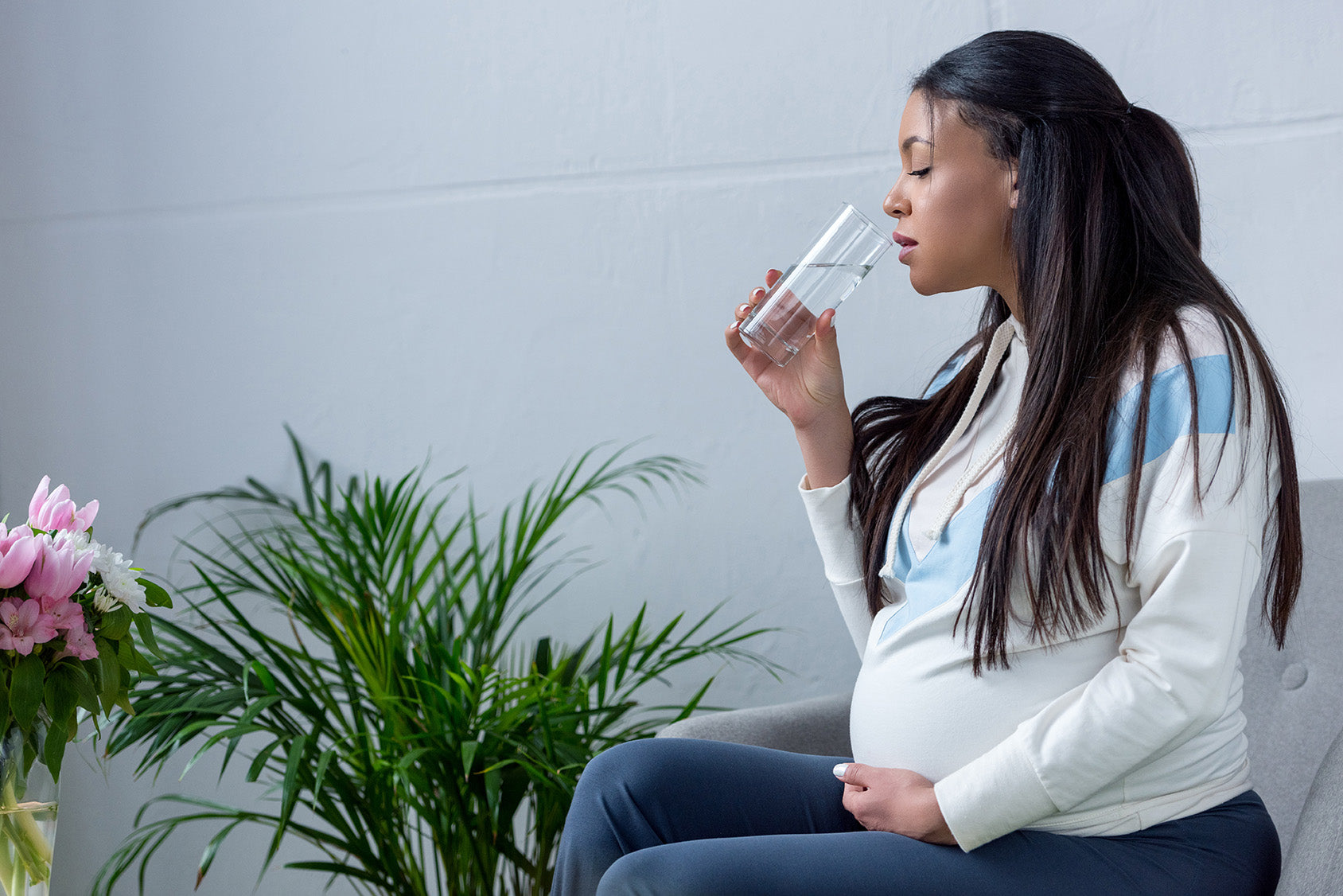Your cart is empty. Let's fix that!


You know the saying water is the source of life? That is never more true than when you are pregnant.
Just as it’s important to eat well, it’s also essential to drink well.
There are many reasons for you to stay well-hydrated during pregnancy, but there are critical benefits to your developing baby as well. In the early stages of pregnancy, your blood volume expands significantly to supply your baby and the placenta. Water composes the majority of this blood content in the form of plasma.
Water also helps your body absorb the essential nutrients from the healthy foods you are eating and transports vitamins and minerals into the blood cells. In the same way, water helps absorb and transport the nutrients in prenatal vitamins. Those nutrient-rich blood cells nourish the placenta and your baby.
Your hydration needs increase during pregnancy because your body requires extra fluids to support fetal circulation and amniotic fluid. Water helps flush toxins out of your system and keeps your amniotic fluid at healthy levels. It also helps you make the extra blood your body requires during pregnancy.
Both you and your baby depend on water to play a vital role in keeping your liver and kidneys functioning properly. Dehydration could lead to inadequate removal of waste substances from your baby's cells and place strain on their liver and kidneys. Dehydration in the third trimester can trigger uterine contractions and lead to preterm labor. Dehydration can also lead to fatigue and constipation — just what you don’t need — and can contribute to urinary tract infections (1).
Hydration also helps during birth, since having an adequate fluid supply ensures that you have the reserves to tolerate blood loss (2).
Keep it up! Hydration continues to be important as your body adapts after delivery, and getting enough water helps you maintain sufficient milk if you are breastfeeding.
The current recommendation is to drink 8–10 glasses of water every day. Water helps you maintain the necessary volume of fluids.
The best thing to drink is purified, filtered water. Some women have trouble drinking plain water, though, especially if they struggle with nausea during the first trimester. If this is the case for you, try seltzer or add a splash of fruit juice to water. (Lemon or other sour juices may help settle your stomach.)
Some tap water contains impurities — anything from unpleasant microscopic organisms to heavy metals from old pipes to chemicals like chlorine used to treat water. Watch out for lead in particular because it can have an effect on the baby’s neurodevelopment (3). Water contamination is of particular concern for those who already have a reduced immunity related to the pregnancy or other factors (2).
We recommend getting a water filter. (A simple pitcher filter can do the trick.) Water filter pitchers are inexpensive and can filter out toxins such as heavy metals, chlorine, and pesticides. It’s a cleaner solution than drinking bottled water because plastic from the bottle can leach into the water. There’s also the cost and waste involved in buying bottled water and disposing of the bottles (4,5).
Not all fluids are the same. Water is best, but other beverages can help you get enough fluids. However, some should be avoided or consumed in moderation.
Pay attention to how your body is feeling. There are several common indicators that can alert you that you need to be taking in more fluids (14).
Water is essential now more than ever, so be sure to get plenty. Drinking those 8-10 glasses of water a day can ward off the ill effects of dehydration. Continue to focus on a healthy diet and supplement nutritional needs with prenatal vitamins like Mama Bird Prenatal Multi+ and Mama Bird AM/PM Prenatal Multi+. The good thing about eating well and staying hydrated during pregnancy is that simple adjustments to your routine can make a big difference in how you feel and in the health of your baby on the way.
(1) Dehydration. Mayo Clinic. 2019 Sep 19. https://www.mayoclinic.org/diseases-conditions/dehydration/symptoms-causes/syc-20354086
(2) Nutrition Column An Update on Water Needs during Pregnancy and Beyond. J Perinat Educ. 2002;11(3):40-42. https://www.ncbi.nlm.nih.gov/pmc/articles/PMC1595116/
(3) Lead and your baby. March of Dimes. 2016 May. https://www.marchofdimes.org/baby/lead-and-your-baby.aspx
(4 )Is it safe to drink tap water when I’m pregnant? Baby Center. Accessed 2021 March. https://www.babycenter.com/pregnancy/diet-and-fitness/is-it-safe-to-drink-tap-water-when-im-pregnant_1246879
(5) Drinking water from the tap vs. Brita: Are water filter pitchers actually better? Headline.com 2019 June 21. https://www.healthline.com/health/home/water-filter-pitcher
(6) Associations of Prenatal and Child Sugar Intake With Child Cognition. Am J Prev Med. 2018 Jun;54(6):727-735. https://pubmed.ncbi.nlm.nih.gov/29674185/
(7) How does liquid sugar harm your body? Healthline.com. Updated 2020 Jan 27. https://www.healthline.com/nutrition/liquid-sugar-calories
(8) Maternal caffeine consumption during pregnancy and the risk of miscarriage: a prospective cohort study. Am J Obstet Gynecol. 2008 Mar;198(3):279.e1-8. https://pubmed.ncbi.nlm.nih.gov/18221932/
(9) Maternal caffeine intake during pregnancy is associated with risk of low birth weight: a systematic review and dose-response meta-analysis. BMC Med. 2014;12:174. Published 2014 Sep 19. https://www.ncbi.nlm.nih.gov/pmc/articles/PMC4198801/
(10) Caffeine content for coffee, tea, soda, and more. Mayo Clinic. 2020 Feb 29. https://www.mayoclinic.org/healthy-lifestyle/nutrition-and-healthy-eating/in-depth/caffeine/art-20049372
(11) Hemorrhoids in pregnancy. Can Fam Physician. 2008;54(2):189-190. https://www.ncbi.nlm.nih.gov/pmc/articles/PMC2278306/
(12) Mayo Clinic Guide To A Healthy Pregnancy Harms, Roger W., M.D., et al, Part 3.
(13) The Environmental Role of Hydration in Kidney Health and Disease. Contrib Nephrol. 2021 Aug 4;199:1-14.
https://pubmed.ncbi.nlm.nih.gov/34348261/
(15)Mayo Clinic – Dehydration. https://www.mayoclinic.org/diseases-conditions/dehydration/basics/symptoms/con-20030056 https://www.mayoclinic.org/diseases-conditions/dehydration/symptoms-causes/syc-20354086